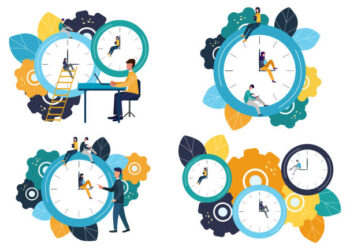
If you have ever wanted to unravel the secrets of highly productive people, you might be getting some answers here in this post. As we all agree, productive people are not aliens or super-humans. They are regular people like you and me who choose to be creative with their time and resources.
Productivity experts like Brian Tracy, Laura Mae Martin, and David Allen have all agreed that a mental shift is a necessary step in boosting productivity. Below, we some of the mindset shifts that can make one highly productive.
Laura Mae talks about a simple mental shift about partitioning your routine activities as a way of boosting productivity.[1]A Google productivity expert shares 5 tips to save time – Google blog David Allen in an interview, discussed the importance of mental clarity and embracing small and consistent habits in becoming highly productive.[2]David Allen Productivity for Consultants Part 2 | Consulting Success And, Brian Tracy in several of his books including “Change Your Thinking, Change Your Life”, emphasizes how changing one’s mindset can lead to greater success, fulfillment, and productivity.[3]“Change Your Thinking, Change Your Life” – Brian Tracy
While so much has been said about the interplay between mindset and productivity, we want to explore some powerful mindsets that make the most productive people on the planet today. These will make you more productive and focused than you have ever been.
1. The Growth Mindset
The “Growth Mindset” was coined by Stanford psychologist Dr. Carol Dweck which in contrast to the “Fixed Mindset”, believes that people gain knowledge and understanding through practice and that having to work hard is not a sign of weakness, rather is part of the human experience and pathway towards success.[4]Productivity and Mindset | Student Success & Retention Innovation – Arizona.edu
Dweck emphasized that we possess both the Growth and the Fixed Mindsets in varying proportions but developing ourselves to have more of a growth mindset is one of the most powerful ways to improve ourselves and productivity.
Highly productive people with a growth mindset believe in trusting the process, and that by putting in the right effort, they will achieve their goals. In contrast, counterproductive people who are more of a fixed-mindset dominant would hold that there is nothing more they can do to improve performance or the status quo.
2. The Positive Mindset
A positive mindset emphasizes the importance of having a motivated and optimistic view of life and things happening around you. In a world filled with so much negativity, developing the positive mindset will make you more focused and motivated, which can translate to higher productivity.
Several authors have talked about the usefulness of a positive mindset in boosting productivity. Let’s explore just a few.
Again, Brian Tracy talked severally about how having a positive mindset in his books including “Change Your Thinking, Change Your Life”. Negative thinking comes with depressive feelings, disappointment, and de-motivation. Not just draining your physical energy but they have also been shown to suppress the body’s immune system, both of which affect productivity one way or another.[5]MDRT – Increasing your brain’s performance for greater personal and professional success
When talking about the Growth Mindset, Carol Dweck also talked about a mindset of positivity. The growth mindset, in itself, represents a mental focus on the great success ahead while enduring the adversity of the moment. This, also, is a demonstration of positivity.
Other proponents of positive thinking and its role in boosting productivity include Tony Robbins and Zig Ziglar. While Tony Robbins shared how to benefit from positive thinking, Zig Ziglar has vehemently expressed that positive thinking will let you do everything better than negative thinking.
3. The Possibility Mindset
The mindset of possibility is another hallmark of highly productive people. They believe that impossibility does not exist, as long as they want to get the job done. It is the mindset of “I can” or “I can do it”.
This mindset makes some of the most disruptive people who don’t care what is against them but believe they can, and they eventually do. This is the set of people Steve Jobs described as rebels, misfits, and crazy enough to think they can change the world.
Have you ever encountered a difficulty while going about a task? These challenges could make some people back down and just do something else, and would only realize how unproductive they have been after trying several things with no results.
Highly productive people with the possibility mindset believe they can achieve success in that thing no matter how much or how long it takes. This mindset is also talked about together with the growth mindset discussed above.
If you say “you can”, you can.
4. The Curiosity Mindset
Curiosity enables productive people to discover what works for them, what methods help them get better, and learn new things around the world. By learning new skills and acquiring new information, curious people can understand the basic principles of success and unravel new ways to be more productive.
Bernard Marr, in one of his articles, quoted Sir Ken Robinson saying, “Curiosity is the engine of achievement”, further buttressing that it is a natural driving force that propels us forward to success and personal fulfillment.
Curiosity pushes us to learn and do more, which is why it has the potential to make one highly productive. However, there is a caveat in the way that curiosity boosts productivity, in that it could hamper productivity if not well guided.
Elizabeth Saunders published a post in Harvard Business Review where she gave an example of how unintentional curiosity can be a distraction. Here is the example she gave. Assume you are working on a task, then you thought “I wonder what the final score of the game was last night. I’ll just look at the stats quickly”, or you saw a link while researching some information and said to yourself, “That looks like an interesting article on the future of energy. I’ll click on it.”[6]Is Your Curiosity Helping or Hurting Your Work? – HBR.org
Those are examples of undirected curiosity, but applying intentionally directed curiosity along the lines of our current task can make you more effective and highly productive, she stated.
5. Resource Management Mindset
Being productive requires you to employ resources, tools, and people. This could involve learning to interact with people, managing your team and building teamwork, or unashamedly adopting new and more efficient tools.
John Rampton, founder and CEO of Due.com, shared his thoughts on the importance of delegation on Startup stating that people who often want to singlehandedly take on the world become more unproductive overall. He stated that having a mindset of being willing and open to delegating tasks, especially if you are at a higher command, can help you and your team get more productive than if you tried to do everything on your own.
This also applies to tools and non-human resources. Now more than ever, there is a rise in productivity tools in the form of calendars, to-do lists, reminders, apps and software, productivity trackers, and so on. Don’t hesitate to explore these tools when you need to. Being resource-oriented is one common mindset of highly productive people.
6. Time Management
Being focused is a function of how condensed your attention is on a task at a given time. Highly productive people learn to develop ways to maximize their time doing things that increase their productivity, which is why time management/control is one of the major mindsets of highly productive people.
Brian Tracy on time management highlighted several ways managing your time effectively can make you more productive. I will thoroughly discuss his 10 rules to manage time and master productivity.
Brian Tracy’s 10 Rules of Productivity (Time Management)
- Utilize the “one-touch” rule: The “touch it once” rule follows a simple plan of completing a task or project in one sitting from start to finish instead of jumping between projects. By so doing, your brain works more efficiently and productively. This is in keeping with
- Write it down: Writing down your thoughts/plans can help you keep track of and measure your progress. By making a to-do list from your thoughts, you can better apportion your time to various tasks and get more productive in the process.
- Set small goals: Instead of tackling big goals head-on, splice them into smaller bits you can easily chew on. In the context of time management, this can save you time and enhance your productivity, as smaller goals reduce your need to procrastinate and waste time instead of getting productive.
- Plan ahead: Planning ahead possibly using a to-do list helps you keep track of your daily tasks ensuring that you get as many things done as possible.
- Avoid over-committing: Over-committing and weighing yourself down with too many tasks will not make you more productive. Rather, it will drain you of your productivity.
- Stop multitasking: As much as you think humans can be good at multitasking, studies have shown contrary evidence. Multitasking can make you less productive and efficient.[7]The Role of Dual Tasking in the Assessment of Gait, Cognition and Community Reintegration of Veterans with Mild Traumatic Brain Injury – PMC
- Start the hardest task first: The law of diminishing returns applies to productivity too. It is an economic law that states that there comes a point when an additional factor of production results in a lessening of output or impact. In the context of productivity, with more and more stimulation to keep working productively, output could start dwindling, hence the importance of starting the hardest tasks first where the energy is still very high.
- Determine when you are most productive: This perfectly aligns with the discussion of identifying peak productivity periods. These are periods of the day when you are most productive. You need to identify and harness those periods for maximum productivity.
- Eliminate disruptions: Whether you are working at home or the office, deliberately eliminate disruptions to the flow of your thoughts. If it means keeping a distance from your phone, turning off notifications for some time, or even moving to a quiet room in your home, it is always productively beneficial to eliminate distractions when working on a task that requires acute attention and focus.
- Set time limits: Last but not least, setting time limits can give you a time target to work towards. Setting time limits or deadlines can be an important way to motivate yourself to achieve your productivity goals.
Other Things That Reduce Your Productivity
- Procrastination.
- Poor rest and sleep.
- Toxic work environment.
- Burnout.
- Disorderliness (in plans and physical space).


















Thanks bro.
nice one bro,i get your point and i love what you are doing.like we know the richest city on earth is the grave yard, WHY ,cos many have gone without realizing,maximizing n working on their potentials.